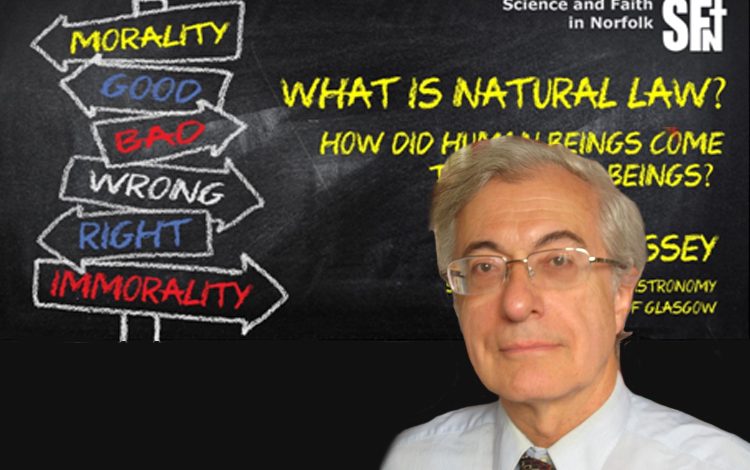Science-faith discussion on moral values

Over fifty people joined a meeting organised by Science and Faith in Norfolk exploring the contested idea of “Natural Moral Law”.The meeting moved to Zoom in response to lockdown and, while many participants were new to on-line discussion, feedback strongly suggested that they appreciated the meeting and would like more virtual events.
Patrick Richmond and Nick Brewin report
Dr Peter Bussey, an experimental physicist with a Christian faith, presented his ideas about how human beings have developed into moral beings with an understanding of right and wrong.The starting point for his talk was the biblical proposition that Natural Law is “God’s Law in our Hearts”. But what exactly is it, and how did it get there?
The concept of Natural Law is not specifically Judaeo-Christian. CS Lewis noted that basic moral principles are similar across cultures and through history. Dr Bussey appealed to St Thomas Aquinas who, in the thirteenth century, argued that there are three areas of universal law that God implants in nature. First, there are the physical laws that govern the universe; second, there are the laws that govern the behaviour of animals; third, there are the moral laws that apply to human behaviour.As humans, Aquinas asserts that we, unlike other animals, rationally discern an objective distinction between good and evil. This leads to the concept of a well-functioning human nature that integrates mind and body. We are not slaves to reason nor to bodily desires. Through conscience we know we ought to do good and avoid evil, but our appetites and desires are out of order with what we ought to do and this means that we often choose wrongly.
Thus, God has put a moral law in humanity, attuned to our human nature and acting like a moral compass pointing towards objective good. Dr Bussey noted several questions about this claim.First, is there really such a thing as absolute, objective moral law? Second, although Aquinas imagined that God created humans as perfect individuals some thousands of years ago, nowadays science shows that humans evolved from animals. So how could morality have evolved, and when did it really become morality, as opposed to the instinctive and social behaviour seen in other animals? Third, is there really such a thing as human nature?
What are moral values and obligations based on? An Illusion? Social pressure and conventions? Or God’s wishes for us? These are highly contested areas but, given limited time, Dr Bussey was content to agree with Richard Dawkins in The God Delusion, “…it is pretty hard to defend absolutist morals on grounds other than religious ones.”Unlike God, social and biological motives have no intrinsic moral authority and so cannot generate an unconditional, categorical moral “ought.” Unbelievers can assert and obey the moral law but what is their basis for granting it absolute, overriding authority?
From the perspective of evolution and socio-biology, it is obvious that animals, including humans, have patterns of behaviour, some innate and some gained in social groups. We humans have personal and social drives and pressures to behave in certain ways.How are these motivations distinct from morality and moral awareness? Charles Darwin noted the ultimate significance of moral consciousness and judgement in his book “The Descent of Man”, writing,“I fully subscribe to the judgement that, of all the differences between man and the lower animals, the moral sense or conscience is the most important.”
With the benefit of our current scientific knowledge, we can elaborate on the distinction between socio-biological motivation and morality. The forms of adaptive social behaviour that we observe in animals (such as wolves) evolved over millions of years through genetic evolution. By contrast, human cultural evolution has only developed recently,over the last few thousand years. This form of evolution has arisen out of human self-consciousness, language and literature, not following genetic change.Human patterns of behaviour reflect conscious, articulated beliefs that some actions are right or wrong. This is a higher form of motivation than social pressures or biological urges.
Underlying this discussion of moral law is the question of what we mean by “human nature”.Anthropology identifies hundreds of traits that may broadly be called human universals and some of these may seem morally relevant.Examples include: – language, kin groups, music, poetry, rights, obligations, etiquette, rituals, taboos, moral sentiments, property,and many others.Following CS Lewis, Dr Bussey thought we can see human nature in such universals, but noted that some things, like xenophobia, revenge and honour killings, are also cultural universals, but not part of the Christian ideal for human nature.
Here Dr Bussey made his Christian proposal, that the Genesis story is not to be taken as a literal history but symbolises that at some early point in human history, God uplifted the evolving human race to a new level of spiritual awareness and partnership. Given what we know of human evolution and palaeontology, this might have been at some time in the middle/upper Palaeolithic, about 60,000 years ago, but Dr Bussey was flexible as to details. This development gave us objective moral values.
There is still the question of “Original Sin.”Dr Bussey thought it probable that the new partnership with God degraded soon after the moral awakening, leaving us too much controlled by what St Paul often calls “the flesh” and what we might understand as the evolved animal drives that conflict with well-functioning human nature.Natural Law remains real and Scripture offers moral inspiration and guidance to follow it.
In the discussion that followed the talk, there was further exploration of a wide range of issues, including the extent to which our perception of moral law is driven by the social context – for example, with changes in attitudes to capital punishment. Another topic was the distinctiveness of morality in Homo sapiens, compared to more primitive hominids such a Neanderthals, and also to other species of social animals.
Dr Peter Bussey is the author of a recent book “Signposts to God”, which explains how modern physics and astronomy can point the way towards belief. Many of the topics covered in his SFN talk are discussed in greater detail in his recent paper in Science and Christian Belief: Volume 32, April 2020. See www.scienceandchristianbelief.org.
Science and Faith in Norfolk (SFN) is a Norwich-based group which aims to explore the broad interface between science and religious belief. For further information, Contact Professor Nick Brewin (07901 884114); [email protected]. Visit the SFN Homepage or follow SFN on Facebook.
Read the full article here








